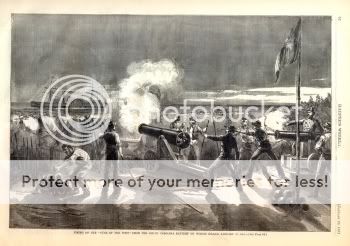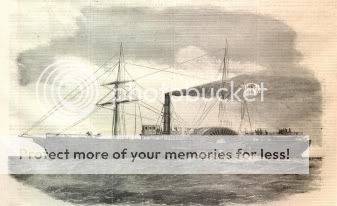Both the President and the Vice president of the CSA said slavery was THE CORNERSTONE of the confederacy.
THE CORNERSTONE. It doesn't get much more foundational than that.
Untitled Document
Charles Dickens "Union means so many millions a year lost to the South; secession means the loss of the same millions to the North. The love of money is the root of this as of many other evils....The quarrel between the North and South is, as it stands, solely a fiscal quarrel"
The North American Review (Boston October 1862): "Slavery is not the cause of the rebellion ....Slavery is the pretext on which the leaders of the rebellion rely, 'to fire the Southern Heart' and through which the greatest degree of unanimity can be produced....Mr. Calhoun, after finding that the South could not be brought into sufficient unanimity by a clamor about the tariff, selected slavery as the better subject for agitation". An editorial in the Charleston Mercury 2 days before the November 1860 election stated: "The real causes of dissatisfaction in the South with the North, are in the unjust taxation and expenditure of the taxes by the Government of the United States, and in the revolution the North has effected in this government from a confederated republic, to a national sectional despotism."
The New Orleans Daily Crescent 21 January 1861: "They [the South] know that it is their import trade that draws from the people's pockets sixty or seventy millions of dollars per annum, in the shape of duties, to be expended mainly in the North, and in the protection and encouragement of Northern interests....These are the reasons why these people [the North] do not wish the South to secede from the Union."
. The Philadelphia Press on 18 March 1861 demanded a blockade of Southern ports, because, if not, "a series of customs houses will be required on the vast inland border from the Atlantic to West Texas. Worse still, with no protective tariff, European goods will under-price Northern goods in Southern markets. Cotton for Northern mills will be charged an export tax. This will cripple the clothing industries and make British mills prosper. Finally, the great inland waterways, the Mississippi, the Missouri, and the Ohio Rivers, will be subject to Southern tolls."
The Chicago Daily Times foretold the disaster that Southern free ports would bring to Northern commerce: "In one single blow our foreign commerce must be reduced to less than one-half what it now is. Our coastwise trade would pass into other hands. One-half of our shipping would lie idle at our wharves. We should lose our trade with the South, with all of its immense profits. Our manufactories would be in utter ruins. Let the South adopt the free-trade system, or that of a tariff for revenue, and these results would likely follow."
Similarly, the economic editor of the NY Times, who had maintained for months that secession would not injure Northern commerce or prosperity, changed his mind on 22 March 1861: "At once shut down every Southern port, destroy its commerce and bring utter ruin on the Confederate States." On 18 March, the Boston Transcript noted that while the Southern states had claimed to secede over the slavery issue, now "the mask has been thrown off and it is apparent that the people of the principal seceding states are now for commercial independence. They dream that the centres of traffic can be changed from Northern to Southern ports....by a revenue system verging on free trade...."
The Republican platform of 1860 called for higher tariffs; that was implemented by the new Congress in the Morill tariff of March 1861, signed by President Buchanan before Lincoln took the oath of office. It imposed the highest tariffs in US history, with over a 50% duty on iron products and 25% on clothing; rates averaged 47%. The nascent Confederacy followed with a low tariff, essentially creating a free-trade zone in the South. Prior to this "war of the tariffs", most Northern newspapers had called for peace through conciliation, but many now cried for war.
the South paid an undue proportion of federal revenues derived from tariffs, and these were expended by the federal government more in the North than the South: in 1840, the South paid 84% of the tariffs, rising to 87% in 1860. They paid 83% of the $13 million federal fishing bounties paid to New England fishermen, and also paid $35 million to Northern shipping interests which had a monopoly on shipping from Southern ports. The South, in effect, was paying tribute to the North. The address of Texas Congressman Reagan on 15 January 1861 summarizes this discontent: "You are not content with the vast millions of tribute we pay you annually under the operation of our revenue law, our navigation laws, your fishing bounties, and by making your people our manufacturers, our merchants, our shippers. You are not satisfied with the vast tribute we pay you to build up your great cities, your railroads, your canals. You are not satisfied with the millions of tribute we have been paying you on account of the balance of exchange which you hold against us. You are not satisfied that we of the South are almost reduced to the condition of overseers of northern capitalists. You are not satisfied with all this; but you must wage a relentless crusade against our rights and institutions." As the London Times of 7 Nov 1861 stated: "The contest is really for empire on the side of the North and for independence on that of the South....".

